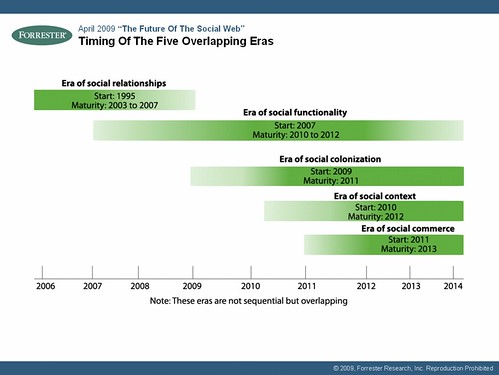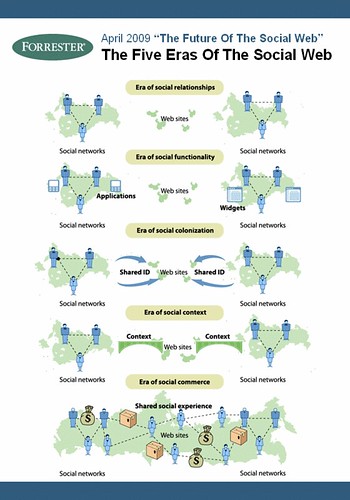Expect the Groundswell to continue, in which people connect to each other –rather than institutions. Consumer adoption of social networks is increasing a rapid pace, brands are adopting even during a recession, so expect the space to rapidly innovate to match this trend. Clients can access this report, but to summarize what we found, in the executive summary we state:
Today’s social experience is disjointed because consumers have separate identities in each social network they visit. A simple set of technologies that enable a portable identity will soon empower consumers to bring their identities with them – transforming marketing, eCommerce, CRM, and advertising. IDs are just the beginning of this transformation, in which the Web will evolve step by step from separate social sites into a shared social experience. Consumers will rely on their peers as they make online decisions, whether or not brands choose to participate. Socially connected consumers will strengthen communities and shift power away from brands and CRM systems; eventually this will result in empowered communities defining the next generation of products.
We found that technologies trigger changes in consumer adoption, and brands will follow, resulting in five distinct waves, they consist of:
The Five Eras of the Social Web:
1) Era of Social Relationships: People connect to others and share
2) Era of Social Functionality: Social networks become like operating system
3) Era of Social Colonization: Every experience can now be social
4) Era of Social Context: Personalized and accurate content
5) Era of Social Commerce: Communities define future products and services
Update: CRM Magazine has more about the five eras, focus in on the graphic.
Timing of the Five Overlapping Eras:
It’s important to note that these eras aren’t sequential, but instead are overlapping. We’ve already entered and have seen maturity for the era of social relationships, have entered social functionality but haven’t seen true utility, and are starting to see threads of social colonization with early technologies like Facebook connect. Soon these federated identities will empower people to enter the era of social context with personalized and social content. The following diagram demonstrates how we should expect to see the eras play out in the future –with social commerce the furthest out.

Interviews with 24 of the top Social Companies:
Research isn’t done in a vacuum, that’s why we conducted qualitative research to find out what we should come to expect. We came to these conclusions based on interviews with executives, product managers, and strategists at the following 24 companies: Appirio, Cisco Eos, Dell, Facebook, Federated Media Publishing, Flock, Gigya, Google (Open Social/stack team), Graphing Social Patterns (Dave McClure), IBM (SOA Team), Intel (social media marketing team), KickApps, LinkedIn, Meebo, Microsoft (Live team), MySpace, OpenID Foundation (Chris Messina), Plaxo, Pluck, Razorfish, ReadWriteWeb, salesforce.com, Six Apart, and Twitter.
How Brands Should Prepare
What’s interesting isn’t this vision for the future, but what it holds in store for brands, as a result, companies should prepare by:
- Don’t Hesitate: These changes are coming at a rapid pace, and we’re in three of these eras by end of year. Brands should prepare by factoring in these eras into their near term plans. Don’t be left behind and let competitors connect with your community before you do.
- Prepare For Transparency: People will be able to surf the web with their friends, as a result you must have a plan. Prepare for every webpage and product to be reviewed by your customers and seen by prospects –even if you choose not to participate.
- Connect with Advocates: Focus on customer advocates, they will sway over prospects, and could defend against detractors. Their opinion is trusted more than yours, and when the power shifts to community, and they start to define what products should be, they become more important than ever.
- Evolve your Enterprise Systems: Your enterprise systems will need to connect to the social web. Social networks and their partners are quickly becoming a source of customer information and lead generation beyond your CRM system. CMS systems will need to inherit social features –pressure your vendors to offer this, or find a community platform.
- Shatter your Corporate Website: In the most radical future, content will come to consumers –rather than them chasing it– prepare to fragment your corporate website and let it distribute to the social web. Let the most important information go and spread to communities where they exist; fish where the fish are.
Translations
If you translate this blog post, I’ll add your link here and credit you.
Dutch: Marketing Facts Team, Bas van de Haterd Spanish: Estategia Digital by Pablo Melchor Danish: Social Media Marketing by Peter Ulstrup Hansen Danish: dSeneste by Søren Storm Hansen Polish: Marketing Technologies by Dawid Pacha Italian: Digital Ingrediants by Stefano Maggi Russian: Shchepotin by Denis Shchepotin Czech: Vlad Hrouda French: We are Social by Sandrine Plasseraud Korean: by Jamie Park Hebrew: Blink by Israel Blechman Indonesian: Wib’s Web World, by Wibisono Sastrodiwiryo German: The Social Media Soapbox, by Stephen Rothman Portuguese: Live from Sao Paulo, Brazil, by Dax Swedish: JMW, by Brit Stakston Norwegian: Cruena by Harald, Creuna Arabic: Technoemedia, by Mohamed Hassan Chinese: Seaberry, by Sylvia Japanese: MinoriG Translation, by Minori Goto Romanian: Blog de Comert Electronic by Adriana Iordan Persian: Lameei, iclub.ir Want to translate it into your language? I’ll be happy to add you, read these suggestions.
This project took a team effort, and I’d like to thank Josh Bernoff a guiding force in my career, Emily Bowen who kept the project going, Cynthia Pflaum for the quantitative data, Megan Chromik in our editing team for the polish, and Jon Symons in our PR team for the media outreach.
This is also cross posted on the Forrester blog for Interactive Marketing Professionals. Thanks to Matt Savarino for catching a small typo.

I’m writing a research project on the emergence of social web in Vietnam, where I currently live and work (and go to school). I’ll be citing your works in my report often! Coming back to the Bay Area just in time to hear you speak at the 140 Twitter Conference! Thank you for speaking at it.
I think you’re confusing ‘brands’ with companies. No matter how much marketers would like, they are not remotely the same the same thing.
As with your other posts, I really appreciate your analysis of this space. I learn something every time I read a post. Thank you.
Question re: evolve Enterprise Systems – which brands/organizations are doing a good job of integrating information generated from social networks (whether it be one they’ve created or another) into their proprietary customer database?
Would love your perspective.
First, let me just say I have been following your posts quite often lately. I wanted to ask whether it is true that the EU just agreed to have all websites ask for the agreement of the visitor when a cookie is being passed through the browser. I think that would be very difficult to manage for us, the not-native internet users¦. Do you know anything about this? Supposedly this would turn all websites more complicated, including blogs? What are cookies and why are they dangerous? Are cookies from your blog safe?
Thank you and very interested in your reply,
Mary,
Well, I haven’t yet had access to whole report but I image implications for accessing and gaining customer insights are going to change and accelerate.
An interesting aspect of this transformation will have to include the linking of non-discrete topics. An example is in order. Most of today’s social networking is based on discrete topics, be they people, products, … One of the interesting challenges will be to link communities who are more interested in ‘fuzzy’ topics, typically expressed as non-discrete business problems, such as creating an effective supply chain management system and delivering an effective web ordering system are fundamentally related.
Communities will link once the leading edge ‘observers’ learn of the connections between the communities and topics, but that initial linkage will become more and more difficult because of the explosion of topics.
This is the hurdle that needs to be crossed to get to the era of social commerce, IMHO.
Oh, by the way, this is a must read article.
Hi,Dear Ladies and Gentlemen,Here are the most
popular, most stylish and avantgarde
shoes,handbags,Tshirts,jacket,Tracksuitw ect…
http://www.Ebizcool.com/ productlist.asp?id=s7
(Tracksuit)
Christmas is approaching, your Christmas gifts ready?
mall for you, which involves a number of
well-known brands from the Asia-Pacific region the
trend of merchandise. Promotional discounts should be,
come SHOPPING bar!Christmas sale, free shipping
discounts are beautifully gift ,Christmas gifts,look,
Best quality, Best reputation , Best services Service
is our Lift.
Nike shox $35,Handbags(Coach lv fendi d&g) $35
Tshirts (Polo ,ed hardy,lacoste) $16
ugg boot,POLO hoody,Jacket,ect…
For details, please consult http://www.Ebizcool.com/
Thanks!!! Advance wish you a merry Christmas.
Thanks Tugce,
It is really useful translate. When I prepare some stuff about the Social Web, I used your translate, Thanks again
sports shoes
Nike Sport Shoes
Women's Nike Sport Shoes
Men's Nike Sport Shoes
Hi! I was doing some research for a paper for a computer literacy class. My tpoic I chose was Social Web. I was wondering if it yould be okay to use some of this article in my paper. Its good stuff, and would make a great ending to the paper
Recently I was extremely low on cash and debts were eating me from all sides! That was UNTIL I decided to make money on the internet! I went to surveymoneymaker dot net, and started filling in surveys for cash, and surely I’ve been far more able to pay my bills!! I’m so glad, I did this.. – xuu2
It has been 5 years now.
can you update this with current condition.
Including who is good on social commerce.
Thank you